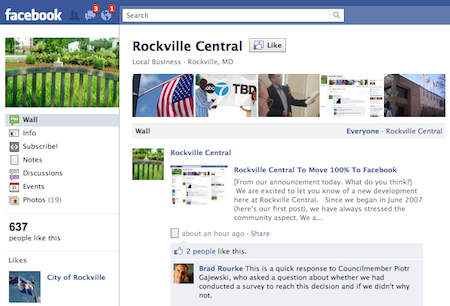
Say you run a community news site. In your spare time. And Patch has moved into your neighborhood. How do you, with limited resources but a desire to keep contributing to your community, stay competitive?
One site’s solution: Take the “site” out of “news site.” Starting March 1, Rockville Central, a community news outlet for the DC-area city of Rockville, Maryland, will move its operation to…its Facebook page. Entirely to its Facebook page.
“There are always two different conversations going on,” Cindy Cotte Griffiths, the site’s editor, told me — one on RockvilleCentral.com, and the other on the site’s Facebook page. Why force the two to compete with each other, when they’re actually, in general, the same conversation? Facebook is, Cotte Griffiths notes, “where the people are.” (Rockville Central currently gets about 2,000 of its average 20,000 monthly hits from Facebook, she told me.) “Everyone’s always trying to get people out of Facebook,” she says. “And we’re like, ‘Well, we’re already here.'”
There are some obvious benefits to the all-Facebook approach. Facebook, for one, has a huge built-in audience — one that is used to sharing and commenting on and contributing content. It has a built-in infrastructure — one that easily accommodates multimedia. It has, essentially, a built-in mobile app. For an outlet that’s run by people who do that running in their spare time — that is, publishers who have even less time than most to deal with concerns about site design, server capacity, and other logistical aspects of digital journalism — Facebook’s insta-infrastructure could free up time that may be spent on more traditionally journalistic endeavors: fact-gathering, conversation-guiding, content-aggregating, community-building, etc.
In fact, with the move to Facebook will come, its publishers hope, a more efficient approach to the content of the journalism itself. “One thing that will change is that we will do less duplicative reporting,” Cotte Griffiths and the site’s founder, Brad Rourke, note in a blog post announcing the move. “For a city its size, Rockville is well-covered, journalistically. We don’t need to duplicate the efforts of our friends. (How many recaps of the Mayor and Council meetings can you read, really?)”
Instead, Cotte Griffiths told me, they’ll redouble their efforts at community-building itself, curating conversations around the news. And the hope is that the Facebook move will help facilitate that curation. Again and again, the social network — probably because of the direct connection it enforces between user behavior and user identity — shows itself to be a generally more “civil” place than the rest of the Internet. (That’s one advantage of a walled garden over an open web.) Cotte Griffiths and Rourke are hoping that the authenticity factor itself will serve as a kind of automatic moderator of commentary within the Rockville Central community. (Currently, the pair polices the site’s comments in addition to their other duties.)
“It seems like a place where people are themselves,” Cotte Griffiths says of Facebook — with all the good that can be connected to genuine identities. “We’re curious to see what happens with that.”
Which is not to say that there won’t be downsides to the move — some inevitable, some merely possible. (A Facebook-hosted outlet, for one example, doesn’t allow for easy tagging of content, which means that an easily accessible archive likely won’t be in the cards for the site — at least for the time being.) The most immediately obvious drawback, though, is that a site hosted on Facebook can’t host its own local ads. In fact, to make the switch, Rockville Central had to return money to its advertisers.
And that’s a sacrifice it’s willing to make. Profit, Cotte Griffiths notes, isn’t itself the site’s overall goal: She and Rourke see the outlet not so much as a money-making vehicle as an experiment in civic engagement. (That gives Rockville Central much more financial flexibility than, say, The Batavian or the West Seattle Blog, which function not merely as labors of love, but also as livelihoods for their publishers.) “For entities and organizations that are trying to turn a profit, or have other institutional or organizational reasons to have a separate identity, it can make sense to have a separate web space,” Cotte Griffiths and Rourke note. “But Rockville Central is different and, as we thought hard about it, we realized we could find no compelling reason that Rockville Central needs to exist as a separate rockvillecentral.com site.”
Then again, Rockville Central isn’t, you know, opposed to turning a profit. And building a strong, committed community on Facebook, Cotte Griffiths points out, could be a means toward developing non-ad-based revenue streams in the future, from hosting conferences to staging community events. (Cotte Griffiths’ day job? Event planner.)
Everything’s on the table; “we’re willing to try anything,” Cotte Griffiths notes. And while a Facebook-hosted outlet could have a leg up when it comes to the holy grail that it “community engagement,” there’s always the chance that the hoped-for audience expansion could end up going the other way. Not everyone’s a Facebook fan. As reader Nick Ferris put it in the comments of Cotte Griffiths’ post:
As a loyal reader of Rockville Central for several years, I must say this decision appalls me. Facebook is the garbage dump of the internet, and Rockville Central really deserves to stand separate from it. I also think putting your entire infrastructure in the hands of a third-party service already well known for its growing privacy concerns and ever-changing terms of service is a bad move.
Rockville Central will be making this move without me and certainly many other readers as well.
Still, though, the move — with all its implications for the future of community news — will be an intriguing experiment to watch. “There’s this big party,” Cotte Griffiths says of Facebook. It’s likely only to get bigger. “And we want to be in there.”